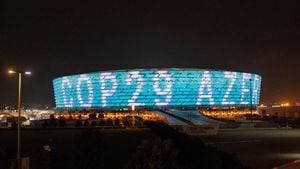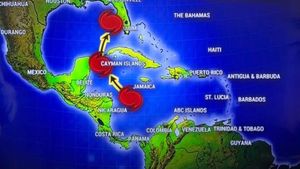Accusations of election fraud have re-emerged as a significant talking point among Trump supporters, with notable claims made recently by political figures claiming dubious voting practices. These allegations have sparked debates nationwide, particularly focusing on key battleground states like Pennsylvania and Alaska.
Former President Donald Trump has been vocal about his belief in widespread voter fraud, repeating existing claims during his campaign rallies and on social media. Recently, he suggested, without evidence, 2,600 fraudulent votes had been cast in Lancaster County, Pennsylvania, raising alarms among his supporters. He stated, "We caught them CHEATING BIG in Pennsylvania. Must announce and PROSECUTE, NOW!" This fervent claim came right after the county began investigating suspicious voter registrations, allegedly linked to third-party efforts to gather new voters. The investigation has turned up hundreds of potentially fraudulent applications, according to Lancaster County Commissioner Ray D'Agostino.
Despite these claims, officials, including Pennsylvania Secretary of the Commonwealth Al Schmidt, have firmly stated, "There is no evidence of anything indicating any sort of widespread voter fraud." This perspective is supported by investigations and audits consistently showing no patterns of significant voter fraud across the state.
Simultaneously, claims about potential election irregularities have also surfaced from Alaska, where Representative Mary Peltola recently suggested there are “thousands” more votes waiting to be counted than reported by the state’s Division of Elections. Peltola’s assertions have raised many eyebrows—her fundraising letters to supporters call for patience as she foresees more ballots arriving from rural regions where Alaska Native voters predominantly reside. "We’re getting new info about my race by the minute," she wrote, requesting support to “ensure every voice is heard.” These remarks have led to suspicions among her opponents, some wondering whether the influx of votes could be leveraged unfairly.
Some political analysts argue these claims are less about actual fraud and more about rallying bases and securing fundraising. Peltola’s comments, though disclaimed by election officials, highlight how the election process might be manipulated to create doubt even when no evidence supports such claims. Despite her optimistic outlook, recent counts suggest she may struggle to overcome her opponent Nick Begich, who is currently leading.
Social media plays a key role, as passions run high and misinformation spreads. For example, conspiracy theories have emerged surrounding the use of Elon Musk’s Starlink technology, wrongly associatively incriminated with the election process. One viral claim detailed on TikTok alleged Starlink satellites were involved in ballot counting. Despite the nonsense of these theories—which have been debunked—their propagation suggests how quickly unfounded accusations can escalate, drawing parallels to the post-2020 elections.
Individuals spreading these theories thrive on attention. According to Elise Thomas, senior open-source analyst at the Institute for Strategic Dialogue, many of these conspiracy theories are driven by the desire for likes and engagement rather than factual accuracy. Development of content surrounding voter fraud continues to flourish, tragically enabling the spread of already refuse claims.
The situation puts voters and election officials at odds, with substantial repercussions depending on what narrative gains traction. Recent analyses, including from the anti-misinformation group, have recorded steep rises in discussions surrounding election integrity, pointing out the rise of baseless claims correlates to the social media discourse around elections. For example, reports from Cyabra, which detected inauthentic accounts driving conspiracy engagement, detail how algorithms can amplify voices pushing narratives absent of feasibility.
This has created significant noise just when things needed to be quiet for official audits and counts. The panic and fervor ignited from early allegations and misinterpretation of isolated cases can lead to loss of public faith within institutions meant to uphold the electoral process. Calls for ethics and integrity have only intensified as political narratives evolve.
Across the spectrum from Pennsylvania to Alaska, the crux of the issue remains the battlefield of confidence within the electoral process. While objective audits and investigations find no evidence, the public perception of fraud remains fertile ground for seeds of doubt. Events surrounding both Peltola and Trump underline how intertwined misinformation can evolve, adapt, and at times dominate the political narrative.



